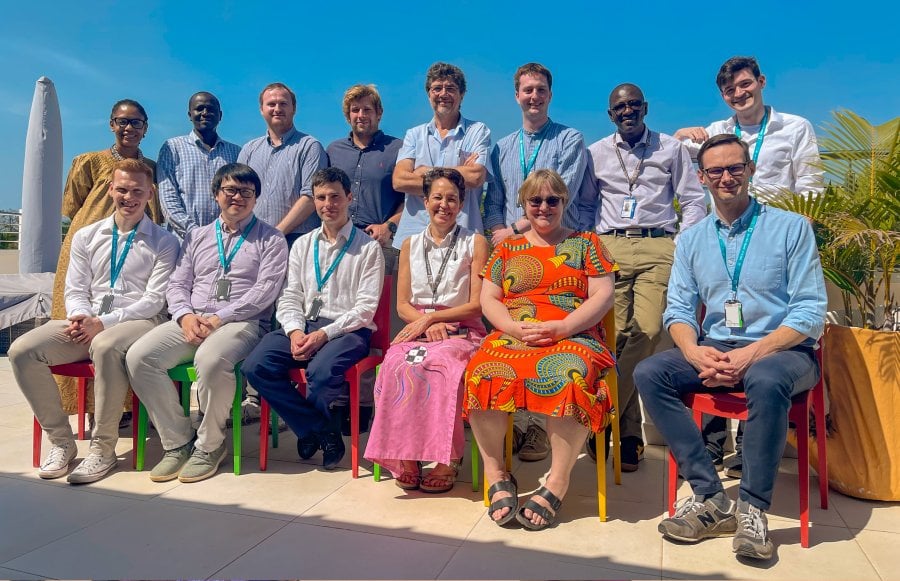Pioneering Healthcare Transformation: MRCG Hosts BloodCounts! Consortium Workshop
3 January 2024 London School of Hygiene & Tropical Medicine London School of Hygiene & Tropical Medicine https://lshtm.ac.uk/themes/custom/lshtm/images/lshtm-logo-black.png
As part of the consortium's collaborative efforts, it organises an annual workshop. The workshop serves as a platform for in-depth discussions, research program reviews, and the exploration of collaborative advancements. The 2023 workshop, hosted by the Medical Research Council Unit The Gambia at the London School of Hygiene and Tropical Medicine (MRCG at LSHTM), brought together 15 participants, including 8 from Cambridge and others from The Gambia. The goal of the workshop was to create a robust surveillance network capable of detecting infectious disease outbreaks and facilitating early diagnoses for non-infectious diseases, all without the need for new instruments or tests.
As a proud partner of BloodCounts! Consortium, MRCG at LSHTM was honored to host the 2023 workshop. This event underscored the Unit's commitment to supporting the detection of infectious outbreaks and advancing early diagnoses of non-infectious diseases. MRCG at LSHTM’s participation in this global effort reinforces its dedication to pioneering solutions that transcend geographical boundaries.
Prof Umberto D'Alessandro, MRCG at LSHTM Unit Director, highlighted the significance of the collaboration with Bloodcounts!.
“Bloodcounts! is a large consortium supported by a grant from Cambridge. The project aims at exploring the usefulness of raw data produced by specific machines analyzing blood samples and uses Artificial Intelligence. This is a fantastic opportunity to link with our Data Science. We already have one PhD student planned to be based in The Gambia to work on this project.”
Prof D’Alessandro stated the Unit’s role in shaping the future of healthcare surveillance and early disease detection on a global scale in pioneering healthcare solutions beyond geographical boundaries.
“Bloodcounts! fits extremely well with the mission of the Unit, particularly within our activities on epidemic preparedness. The consortium provides the opportunity to further develop our research activities in this area,” he said.
Fan Zhang, a PhD student at the Department of Applied Mathematics and Theoretical Physics at the University of Cambridge, stated the significance of attending the workshop at MRCG at LSHTM.
“Participating in this course at MRCG at LSHTM in Africa was incredibly meaningful, especially as it is my first time visiting the continent. It was an exciting experience to meet new people and learn about different practices and real-world healthcare applications in a different setting like The Gambia.”
Speaking on the benefits he gained from the workshop, Fan said; “The BloodCounts! consortium workshop greatly enhanced my understanding of how machine learning models are applied to full blood count data to improve diagnostic efficiency. The presentations at the workshop were educational and informative, which helped me realise the significant role of AI in boosting clinical efficiency and these solutions have the potential to be more generalised with extensive data.”
Joseph Taylor, a Hematology Consultant working in BartsHealth NHS Trust, London stated that “collaborations like BloodCounts! allow us all to achieve so much more than we could alone. It brings together people with common interests from different disciplines and by sharing data allows us to build more powerful models that work worldwide rather than being restricted to specific settings or populations.”
Joseph added; “Partnering with MRC Gambia brings specialist insight to ensure our projects have appropriate design and focus for maximum global impact and meet the needs of populations in West Africa. Meanwhile, their support with data is essential in making sure our models work across populations worldwide.”
LSHTM's short courses provide opportunities to study specialised topics across a broad range of public and global health fields. From AMR to vaccines, travel medicine to clinical trials, and modelling to malaria, refresh your skills and join one of our short courses today.